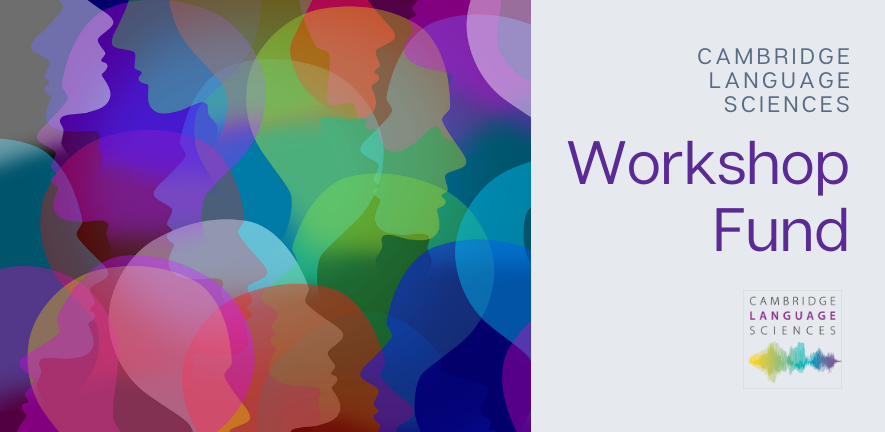
Submitted by Jane Durkin on Wed, 11/05/2022 - 10:22
We are pleased to announce that two events have been awarded funding through the Language Sciences Workshop Fund, which launched in March 2022.
The Cambridge Language Sciences Workshop Fund offers support for interdisciplinary workshops on ambitious questions of societal importance requiring further research.
The workshops will contribute to the development of new research activity linked to one of the following ‘moonshot’ questions:
Language, Trust & Society: How can people with diverging views be supported to successfully communicate and negotiate?
Development of new technology has outpaced the evolution of mediation and politeness conventions. Answering this question requires understanding how people communicate and miscommunicate, how disputes can be resolved, and what tools could make these processes smoother.
Language & Education: How can learning a second language be made effortless?
The majority of the world's population learns at least one second language, but even motivated learners typically take thousands of hours of study and practice to reach proficiency. Answering this question requires understanding the process of language learning, which aspects are difficult or effortful, and how this process changes with different contexts or approaches to learning and teaching.
About the workshops
For updates about these events and other news from Cambridge Language Sciences, please join our mailing list or email contact@languagesciences.cam.ac.uk.
About the workshops
How can people with diverging views be supported to successfully communicate and negotiate? Understanding how we can make better decisions using existing and emerging techniques and technologies of argumentative communication
This one-day workshop is convened by Andreas Vlachos, Associate Professor at the Department of Computer Science and Technology and Tom Stafford, Lecturer in Psychology at the University of Sheffield, with Georgi Karadzhov, Christine De Kock and Youmna Farag from Cambridge's Department of Computer Science and Technology.
About the event
Human societies have evolved a variety of successful structures for communication and negotiation between individuals with diverse or conflicting viewpoints. These range from manners governing polite conversation, to laws around jury trials, procedures for formal debates, academic peer review, and even the processes of democratic elections. The development of new digital technologies in the space of social media, natural language processing and machine learning is accelerating disruption of these old forms of communication. At the same time, it also creates platforms for new possibilities.
Research into decision making has shown that groups collaborating on a problem can, in the right conditions, outperform even the most knowledgeable of individual group members. The exchange of arguments has been shown to be key to this. Technologies which support better argument production, exchange and comprehension have great potential both in understanding how we can make better decisions, and in enhancing personal, educational and workplace environments where argument exchange can boost productivity and wellbeing.
This workshop will bring together experts in existing and emerging techniques and technologies of argumentative communication, to explore how the old can inform the new and how the new can augment the old. Our goal is to gather people from psychology, social, political and computer sciences to, providing a platform for them to collaborate and share their research, towards answering the ‘moonshot’ question: “How can people with diverging views be supported to successfully communicate and negotiate?”. The intended outcome is for this workshop to become a regular event, in order to foster further collaboration and result in new interdisciplinary projects.
The workshop will be hosted in Cambridge in mid-October 2022.
How can learning a second language be made effortless? Exploring novel opportunities and challenges for non-native language learning
This is a two-day workshop convened by Matt Davis, Senior Research Scientist at the MRC Cognition and Brain Sciences Unit and Ianthi Tsimpli, Professor of English and Applied Linguistics in the Department of Theoretical and Applied Linguistics.
The aim is to explore essential differences between native and non-native language learning with a view to finding novel perspectives on the opportunities and challenges for non-native language learning.
About the event
It is an enduring mystery why learning an additional language is so very difficult in adulthood, but seemingly effortless in childhood. The fact that adult language learning is so challenging and leads to such variable, and sub-optimal outcomes has led many to argue for sensitive or critical periods for learning; i.e. infant or child learners have access to cognitive or neural mechanisms for learning that are less apparent or ineffective in adults. Yet, recent research has highlighted forms of language learning that continue to operate rapidly, automatically, and effortlessly during native language comprehension even in adults who are well beyond traditionally-assumed sensitive periods.
This workshop will explore similarities and differences between these highly effective forms of native language learning, and the more effortful and challenging learning seen in non-native language learners. Our goal is to use these comparisons to provide theoretical and pedagogical insights into the essential differences between native and non-native learning.
The workshop will take place at the MRC Cognition and Brain Sciences Unit in Spring 2023.
